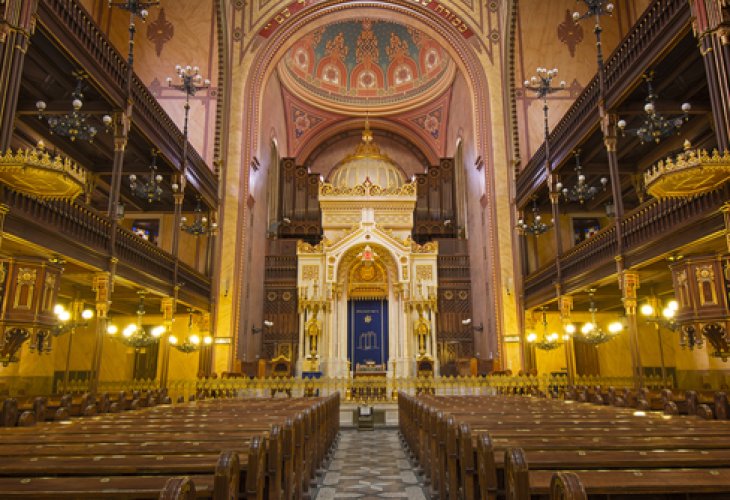Jewish Law
The Laws and Sanctity of the Synagogue: Understanding Rambam’s Guidelines for Respect and Reverence
A comprehensive guide to the mitzvah of honoring holy spaces, proper conduct in a synagogue, and the halachic foundations of Jewish prayer halls

It is a mitzvah to show honor and reverence in synagogues. The source of this mitzvah is the command: “And you shall fear your God.” On this mitzvah, the Sefer Yere’im explains: “It is written, ‘And you shall fear your God.’ When a person enters the Temple, a synagogue, or a house of study, he must conduct himself with awe and respect. As it says, ‘You shall keep My Shabbat and revere My Sanctuary’ — you are not fearing the Sanctuary itself, but rather the One who commanded regarding the Sanctuary, meaning the Holy One, blessed be He.”
In the Mishneh Torah, Book of Ahavah, Laws of Prayer, Rambam (Maimonides) establishes the laws concerning the synagogue — its sanctity and the reverence due to it:
1. The obligation and mitzvah to establish a synagogue
The Rambam rules: “Any place where ten Jews live must prepare a house where they can gather to pray at every prayer time.”
He adds: “The members of a town may compel one another to build a synagogue and to purchase a Torah scroll, Prophets, and Writings.”
2. No frivolity or casual behavior in a synagogue
The Rambam further rules: “In synagogues and houses of study, one may not behave with frivolity — no joking, no idle chatter, no levity. One may not eat there, drink there, adorn oneself there, or stroll around. Nor may one enter them simply to escape the heat or rain.”
3. Torah scholars may eat and drink there
In the next halacha, Rambam notes an exception: “Scholars and their students may eat and drink in a synagogue when necessary.”
4. Only mitzvah-related activities are permitted
It is forbidden to conduct any business or activity in a synagogue unless it pertains to a mitzvah. Rambam writes: “One may not calculate accounts in them unless they are accounts of a mitzvah — for example, charity funds, ransom of captives, etc. One may not deliver eulogies there except for a public eulogy for great scholars for whom the entire community gathers.”
5. A synagogue may not be used as a shortcut
Due to its sanctity, it is ruled: “If a synagogue has two entrances, one may not enter through one and exit through the other in order to shorten the path. One may only enter for a matter of a mitzvah.”
6. May one enter a synagogue just to call someone inside?
One may not enter a synagogue solely to call someone out. Rambam writes: “One who needs to enter a synagogue to call a child or a friend should first read a few verses or recite a teaching, and afterwards call his friend — so that he does not enter for his own personal need alone.”
7. Someone who cannot learn
Rambam continues: “If he cannot read or study, he should ask a child: ‘Recite for me the verse you are learning,’ or he should sit there briefly and only then leave — for sitting in a synagogue is itself a mitzvah, as it says: ‘Happy are those who dwell in Your house.’”
8. What is the law regarding synagogues that have been destroyed?
“Synagogues and houses of study that have been destroyed retain their sanctity, as it says: ‘And I will lay your sanctuaries waste’ — even when desolate, they remain sacred. The same rules apply to them as when they were standing, except for sweeping and sprinkling water, which are not done. If weeds grow there, one may not uproot them; and if they were uprooted, they must be left in place so that people will see them, be stirred, and be motivated to rebuild.”
9. A synagogue may not be demolished, even to build another
Because of its sanctity, the halacha states: “One may not demolish a synagogue in order to build another one in its place or elsewhere. Rather, one must first build the new one and only then demolish the old — lest an unforeseen event occur and the community be left without a synagogue. Even a single wall may not be dismantled until the replacement is ready.”
10. The highest sanctity is the Torah scroll
Rambam concludes: “One may convert a synagogue into a house of study, but not the reverse — for a house of study possesses greater sanctity than a synagogue. In matters of holiness, we ascend and do not descend. If a Torah scroll is sold, its proceeds may be used only to purchase another Torah scroll, for nothing has greater sanctity than a Sefer Torah.”

